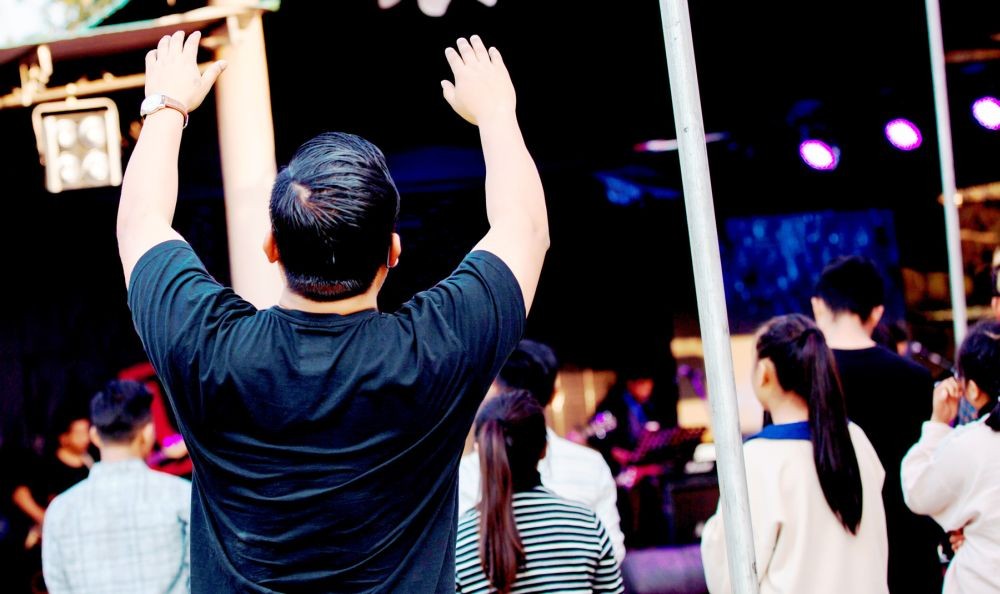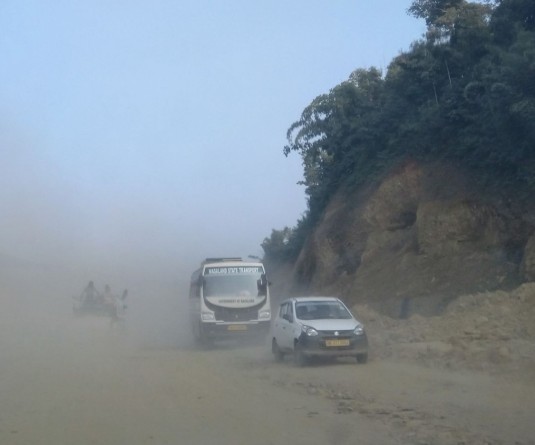A man lifts up his hands while attending a worship service in Dimapur. (Morung File Photo)

There’s been soul-searching recently over ‘materialism’ in Nagaland’s houses of worship
Morung Express News
Dimapur | March 13
A recent poll taken by The Morung Express, found at least 58 per cent of respondents felt that there was an undercurrent of ‘materialism’ in the churches of Nagaland while 22 per cent felt that the church was most influenced by ‘Biblical teachings.’ Another 13 per cent viewed that ‘tribal culture’ was an influence on the church while 7 per cent chose ‘others.’
The respondents weighed in on what has long been a tender subject: the encroachment of materialism and tribal influences and politics, the money that flows into churches and the way it is spent.
According to one respondent, tribal politics and culture continues to influence the church in Nagaland. “The village and range politics even decides who becomes the pastor. For the church to become the church of God, it must free itself from the clutches of tribal influence and materialism,” the comment read.
Similarly, another poll respondent noted the irony in the way that, “people have started competing and fighting even for the post of a pastor, etc,” and called on church leaders to ‘wake up and change.’
Some also viewed that the influence of tribal culture and traditions were reasons why the church tends to be, “parochial and rigid in its understanding of the society,” and opined that the church, “instead of submitting to God’s authority seems to be bowing down to the law of the land.”
“When driving high end cars, wearing designers clothing and building biggest churches are we not materialistic?” one respondent questioned.
Among the respondents, there were also those who believed that the churches are being influenced by ‘societal norms’ instead of Christian values. “Have you seen any poor pastor?” they asked while adding that if Christian values were followed, “Nagaland would have been a corruption free state, flourishing in development and people will be extremely friendly and helpful to one another.”
The Church in Nagaland encompasses the hundreds of individual churches, fellowships, mission centres, and other social-service agencies and organizations that are affiliated to the Nagaland Baptist Church Council (NBCC). Besides being places of worship, the Church is considered as one of the most influential organisations in the predominantly Baptist Christian state.
The relationship between the Church and the Naga people has been one of reverence and loyalty, however, in recent times; several independent churches have gained increasing popularity especially among the young.
Why independent churches?
This newspaper interacted with some of the youths who gave varied views on why they preferred independent churches. “I feel that most local churches are like social gatherings and some go to church to show their faces,” one of them said while adding that there is an evident practice of VIP culture in local churches.
For Aki who served in the Children Ministry of her local church for seven years, the shift came after witnessing ‘conflicts’ among church leaders. “Seven years is long enough to observe the entire scenario of church politics,” Aki said while adding that even the sermons would often be directed towards those in the opposing end of the conflict, instead of providing guidance to the congregation.
Aki also stated that she expects the church to guide her towards becoming a better human being and a Christian who walks on Jesus’ principles. “And in my observations and experiences, the two Independent churches I’ve been to in Nagaland fulfill the above-mentioned models of a homely-church where sinners are not judged but accepted and helped to transform,” she said.
“NBCC churches truly need to question why many of the local churches are becoming colder and why young people don’t like to even go to the youth services,” she added.
‘Lazy leaders’
In the prevailing scenario, NBCC Youth Secretary, Rev Vikuo Rhi acknowledged that the churches were not without blame and said that there are ‘lazy leaders,’ who do not look after the spiritual needs of the congregation. However, he also pointed out that a generalization of churches would be unfair, especially on those who diligently and faithfully tend to their congregation.
The Youth Secretary also addressed concerns raised by a poll respondent that, “Those who donate even by unethical means are valued more” by the churches, and said that the NBCC discourages taking such donations that comes through ‘unethical means.’
However, he also stated his observation that it also out of the hands of church leaders to check where each donation is coming from.
With regard to conflicts that arise in local churches, Rev Rhi stated that when such instances come to light, the NBCC also needs to step up and guide the local churches. Keeping a check on all the individual churches can however become a daunting task as there are over a thousand churches in the state.
According to Rev Rhi, matters concerning individual local churches are often resolved by the respective associations and the Council is often left out. In this regard, he said that the council can only advice and guide the associations on how to address the matter appropriately.
Rev Rhi further said that are so many good and bad things happening simultaneously in the Naga society. Stating that a vast majority of people in any field in Nagaland are Christians, he laid emphasis on the need for every individual Christian to retrospect on why or how these things are happening. The churches, he said, must also admit to its weaknesses and give their best for its congregation.






